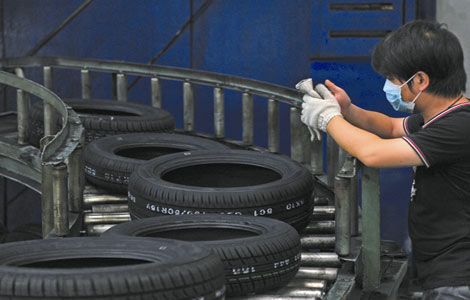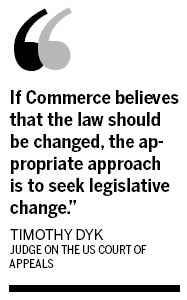US court concludes tariffs on Chinese goods illegal
Updated: 2011-12-21 07:52
(China Daily)
|
|||||||||
|
 A worker inspects tires at a Hankook Tire Co Ltd plant in Jiaxing, Zhejiang province. According to experts, the decision by the US appeals court essentially throws out the countervailing duty cases filed against China at the Commerce Department since 2007. [Chu Yongzhi / For China Daily] |
Commerce Department does not have power to levy duties: Judges
WASHINGTON - US companies from steel to paper makers may lose a tool they've used to fight perceived undervalued Chinese imports after a US appeals court rejected the imposition of duties to offset alleged foreign government subsidies.
US law doesn't let the Commerce Department levy duties on goods from nations, such as China, that lack a market to set prices, a US Court of Appeals in Washington said on Monday in a unanimous ruling. Congressional action is needed to give the agency that power, the judges ruled.
The decision rejected arguments by Titan International Inc, the top US maker of off-road tires, Bridgestone Americas Inc, a unit of Tokyo-based Bridgestone Corp, and the AFL-CIO labor federation.
It may take years for the companies to appeal or press for legislation, said George Thompson, a lawyer at Neville Peterson LLP in Washington.
"Usually something of this magnitude is going to be part of an overall trade bill, and I don't see any of those coming down the road anytime soon," Thompson, who has represented both US and foreign companies, said in an interview.
"You'd be foolish to start a case, based on the likelihood that this is going to be the final decision," he said.
The United States uses more than 300 anti-dumping and countervailing duty orders to shield American-made goods, from honey to bedroom furniture, against global competition. About half the orders target iron and steel products.
China cases
|
|
China accounts for one-third of all US cases, the most of any country, including about 100 anti-dumping and more than two dozen countervailing duty orders, according to the US International Trade Commission.
Anti-dumping duties are applied to goods accused of being sold overseas at or below the price in the home country. Countervailing duties aim to offset the benefits of alleged government subsidies to industries.
In laws passed in 1988 and 1994, "Congress adopted the position that countervailing duty law does not apply to non-market economy countries", Judge Timothy Dyk wrote in the decision posted on the court's website on Monday. "If Commerce believes that the law should be changed, the appropriate approach is to seek legislative change."
The three-judge panel upheld a US Court of International Trade decision that found the Commerce Department action on Chinese tires was illegal.
Charles Miller, a spokesman for the Justice Department, which presented the US case, declined to comment on the ruling.
A phone message for Joe Dorn, an attorney with King & Spalding LLP representing Bridgestone Americas, wasn't returned. A spokeswoman for Representative Kevin Brady, who heads the House Ways and Means Committee's trade panel, said the Texas Republican is reviewing the decision.
Congressional action
"I've always felt that if the courts were to ultimately declare that the administration cannot apply the anti-subsidy law to China, Congress will act within about a week to make it clear that the administration can," said David Spooner, a former Commerce Department official now at the law firm Squire Sanders & Dempsey LLP in Washington.
The Commerce Department under former US president George W. Bush reversed course on more than two decades of precedent and allowed both anti-dumping duties and countervailing duties against imports from China.
The decision essentially "throws out" the countervailing duty cases filed against China at the Commerce Department since 2007, said Daniel Porter, a lawyer at Winston & Strawn LLP in Washington who argued in favor of the Chinese producers.
The solar-power industry has been among those petitioning for tariffs on Chinese imports.
The US International Trade Commission on Dec 2 took the first step toward imposing added duties on Chinese solar cells, saying alleged subsidies for the products harm equipment makers such as the US unit of SolarWorld AG, which filed a case at the Commerce Department.
Bloomberg News












